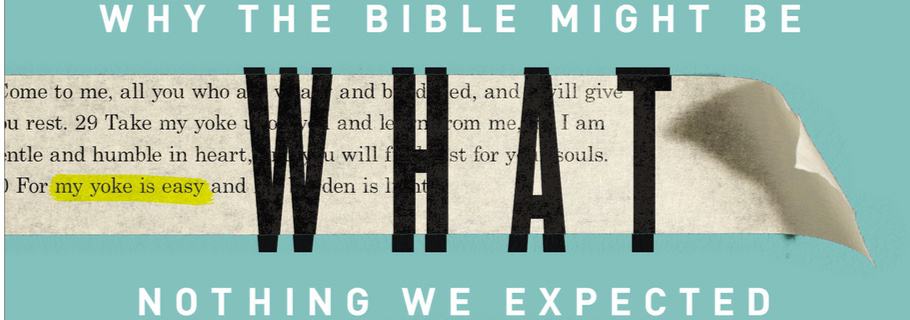While the gospel remains fixed and unchanging, every generation is different from the one before. While God’s Word is always true and powerful, each generation has its own doubts and questions. This means that each generation needs to be taught about God and his Word in a unique way. Where gen X might have responded well to the clear, straightforward answers of Evidence that Demands a Verdict, today’s millennials are not wrestling with those issues and may not be satisfied with those answers.
Not What You Think by the husband-wife team of Michael and Lauren McAfee, is an attempt to meet the skepticism of the millennial generation—a generation that has some guarded respect for the Bible, but also a lot of very serious questions. They don’t know the Bible well, but have heard that it’s misogynistic and patriarchal. They haven’t read many of its words, but are convinced it’s divisive and homophobic. But the McAfees, millennials themselves, want to encourage people to try the Bible, to explore it themselves, and they intend to serve as guides for this experience. “We are there with you, exploring and wrestling and discovering together the value of the Bible and what it might mean for your life and our lives.”
As they’ve spoken to their fellow millennials, they’ve found that objections to the Bible tend to fall into two categories: cultural perception and personal experiences. “Many people are wary of engaging with the Bible because they feel the culture at large has a negative perception of it; the Bible is viewed as being intolerant, outdated, and out of step with American cultural norms. To read the Bible or to live your life by it would mean pitting yourself against culture and isolating yourself from the mainstream.” The second objection is based on personal experience. “Others are hesitant to engage with the Bible because their experiences with religion have been less than stellar. They grew up in a religious household or in the Bible Belt, and because of something a parent, a pastor, or a community said or did, they want nothing to do with the source of that old-time religion, the Bible.”
In their book they speak to both of these groups, and do so well. When it comes to issues related to cultural perception, they show how millennials are engaging the Bible differently from previous generations, then show how the Bible and its followers have so positively impacted culture over the centuries. They also explore the uniqueness of the Bible as a book, a religious text, and a record of history. When it comes to the issues of personal experience, they look at the importance of reading and they commend millennials for their willingness to read and explore ideas. They then look at how the Bible is the story of humanity and how it offers deeply satisfying answers to our deepest spiritual questions. “The Bible is important not just because it defines spirituality; it is important and even revolutionary because of the type of spirituality it defines.” It’s a spirituality that is mediated, supernatural, and grace-filled.
As the book comes to an end, they challenge their readers to simply try reading the Bible for themselves. “We do not want you to just accept our opinions. We want to invite you to challenge, test, and question your assumptions about the Bible and Christianity, to come and see for yourself.”
As they’ve explored the Bible, now as adults but first as children and teens raised in Christian homes, the McAfees have grown in confidence that it is all that it claims to be and is worthy of trust and respect. And now they’re sharing their enthusiasm and conviction with their generation. They’ve done so in an excellent book that is ideally suited for their target audience. As I run into skeptical or interested millennials, Not What You Think is one of the very first books I’d recommend to them.










